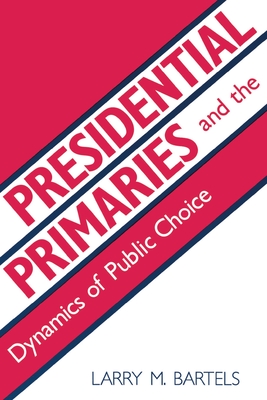

 Princeton University Press
Princeton University Press
Presidential Primaries and the Dynamics of Public Choice


Key Metrics
- Larry M Bartels
- Princeton University Press
- Paperback
- 9780691022833
- 9.27 X 6.13 X 0.95 inches
- 1.24 pounds
- Political Science > Political Process - Campaigns & Elections
- English
 Secure Transaction
Secure TransactionBook Description
This innovative study blends sophisticated statistical analyses, campaign anecdotes, and penetrating political insight to produce a fascinating exploration of one of America's most controversial political institutions--the process by which our major parties nominate candidates for the presidency. Larry Bartels focuses on the nature and impact of momentum in the contemporary nominating system. He describes the complex interconnections among primary election results, expectations, and subsequent primary results that have made it possible for candidates like Jimmy Carter, George Bush, and Gary Hart to emerge from relative obscurity into political prominence in recent nominating campaigns. In the course of his analysis, he addresses questions central to any understanding--or evaluation--of the modern nominating process. How do fundamental political predispositions influence the behavior of primary voters? How quickly does the public learn about new candidates? Under what circumstances will primary success itself generate subsequent primary success? And what are the psychological processes underlying this dynamic tendency?
Professor Bartels examines the likely consequences of some proposed alternatives to the current nominating process, including a regional primary system and a one-day national primary. Thus the work will be of interest to political activists, would-be reformers, and interested observers of the American political scene, as well as to students of public opinion, voting behavior, the news media, campaigns, and electoral institutions.
Author Bio
Larry M. Bartels holds the May Werthan Shayne Chair of Public Policy and Social Science at Vanderbilt University. His scholarship and teaching focus on public opinion, electoral politics, public policy, and political representation.
His books include Democracy for Realists: Why Elections Do Not Produce Responsive Government (with Christopher Achen) and Unequal Democracy: The Political Economy of the New Gilded Age (2nd edition), both published in 2016. He is also the author of numerous scholarly articles, and of commentaries in the New York Times, Washington Post, and other prominent outlets. Bartels has received the Warren E. Miller Prize for contributions to the study of elections, public opinion, and voting behavior and Vanderbilt’s Earl Sutherland Prize for Career Achievement in Research.
He is a fellow of the American Academy of Arts and Sciences and of the American Academy of Political and Social Science and a member of the National Academy of Sciences and of the American Philosophical Society.
Source: Department of Political Science, Vanderbilt University
Videos






Community reviews
Write a ReviewNo Community reviews